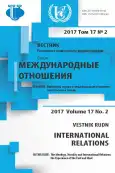“Oppressed - oppressors” dichotomy in shiʻite perception of international relations
- Authors: Chikrizova O.S.1
-
Affiliations:
- Peoples’ Friendship University of Russia (RUDN University)
- Issue: Vol 17, No 2 (2017): The Ideology, morality and international relations: the experience of the East and West
- Pages: 279-289
- Section: THEMATIC DOSSIER
- URL: https://journals.rcsi.science/2313-0660/article/view/338943
- DOI: https://doi.org/10.22363/2313-0660-2017-17-2-279-289
- ID: 338943
Cite item
Full Text
Abstract
The article deals with “oppressed - oppressors” (mustadʻafun - mustakbirun) dichotomy. It was proposed inside Shiʻism and became an important element of International Relations (IR) theory and practice of such countries as Iran and Lebanon. The author discovers peculiarities of the Muslim states’ IR perception and also explains differences between a process of world view formation in the West and the Islamic world. The most important aspects of “oppressed - oppressors” dichotomy that underlies Shiʻite interpretation of IR and Influences on foreign policy of Iran and Lebanon, were elaborated by such Shiʻite religious scholars as Muhammad Baqir al-Sadr, Musa al-Sadr, Ruhollah Khomeini, and Muhammad Hussein Fadlallah. Their world views are based on the interpretation of the most important sources of Islam - the Qurʻan and hadiths. Thoughts of Shiʻite religious authorities took a wide distribution and popularity at different countries of the Islamic world in 1970’s. It was determined by the fact that these thoughts became a reaction on discontent of the Middle Eastern countries’ population on interference into their domestic affairs by the Western states, monopolization on the region’s natural resources by the Western companies and also negligence of the local governments that allowed neo-colonialism. Moreover, by that time the Middle Eastern countries had disappointed either in Socialism or in capitalism that both couldn’t resolve problems which impeded the Muslim states’ development. Shiʻites as a part of the Islamic world that during their long history were nearly always persecuted by Sunni majority, expressed that the oppressed Muslim nations didn’t need to adopt any Western ideology because the only Islam could become the answer on all the questions and a key weapon in the struggle against the oppressors.
About the authors
Ol'ga Sergeevna Chikrizova
Peoples’ Friendship University of Russia (RUDN University)
Author for correspondence.
Email: chikrizova_os@rudn.university
Moscow, Russia
References
- Abrahamian, E. (1993). Khomeinism: Essays on the Islamic Republic. Berkeley and Los Angeles: University of California Press.
- Amir-Moezzi, M. A. (2012). Eschatology III. Imami Shiʻism. Encyclopedia Iranica. Available at: http://www.iranicaonline.org/articles/eschatology-iii (accessed: 25.12.2016).
- Badawi, E. M. & Abdel Haleem, M. (2008). Arabic-English Dictionary of Qurʻanic Usage. Leiden: Brill.
- Berenkova, N. A. (2015). Fenomen shiitskogo aktivizma v Livane i ego vliyanie na mezhdunarodnye otnosheniya Blizhnego Vostoka (1967—2013) [Shiʻite Activism Phenomenon in Lebanon and its Influence on International Relations in the Middle East (1967—2013)] [dissertation]: Dis. ... kand. ist. nauk: 07.00.15 / Berenkova Natal'ya Aleksandrovna. Nizhniy Novgorod: Nizhegorodskii gos. un-t im. N. I. Lobachevskogo. (in Russ.).
- Islam: Encyclopaedic Dictionary. (1991). Exec. sec. S. M. Prozorov. Moscow: Nauka. Glavnaya redaktsiya vostochnoi literatury. (in Russ.).
- Kalyadin, A. (2008). Iran Nuclear Challenge in the Perspective of the UN Security Council. World Economics and International Relations, 12, 51—57. (in Russ.).
- Lewis, B. (1988). The Political Language of Islam. Chicago: University of Chicago Press.
- Mauriello, R. & Marandi, S. M. (2016). Oppressors and Oppressed Reconsidered: A Shiʻitologic Perspective on the Islamic Republic of Iran and Hezbollah’s Outlook on International Relations. In: Islam and International Relations. Contributions to Theory and Practice. Ed. by D. Abdelkader, N. Manabilang Adiong and R. Mauriello. New York: Palgrave Macmillan, p. 50—71.
- Rahnema, A. (2013). Jamʻiyat-e Moʻtalefa-ye Eslami II. Jamʻiyat-e Moʻtalefa and the Islamic Revolution. Encyclopedia Iranica. Available at: http://www.iranicaonline.org/articles/jamiyat-e-motalefa-ii (accessed: 25.12.2016).
- Sazhin, V. I. (2003). BASIJ Resistance Forces in Iran. Institut izucheniya Blizhnego Vostoka. Available at: http://www.iimes.ru/?p=2962 (accessed: 05.01.2017). (in Russ.).
- Voronin, S. A. (2011). Nation or Muslim Community. Islamic World in Search of Identity. RUDN Journal of World History, 2, 48—71.
- Yurtaev, V. I. (2012). Peculiarities and realization of the Islamic Republic of Iran’s Foreign Policy (1979—2010). Moscow: RUDN.
Supplementary files









